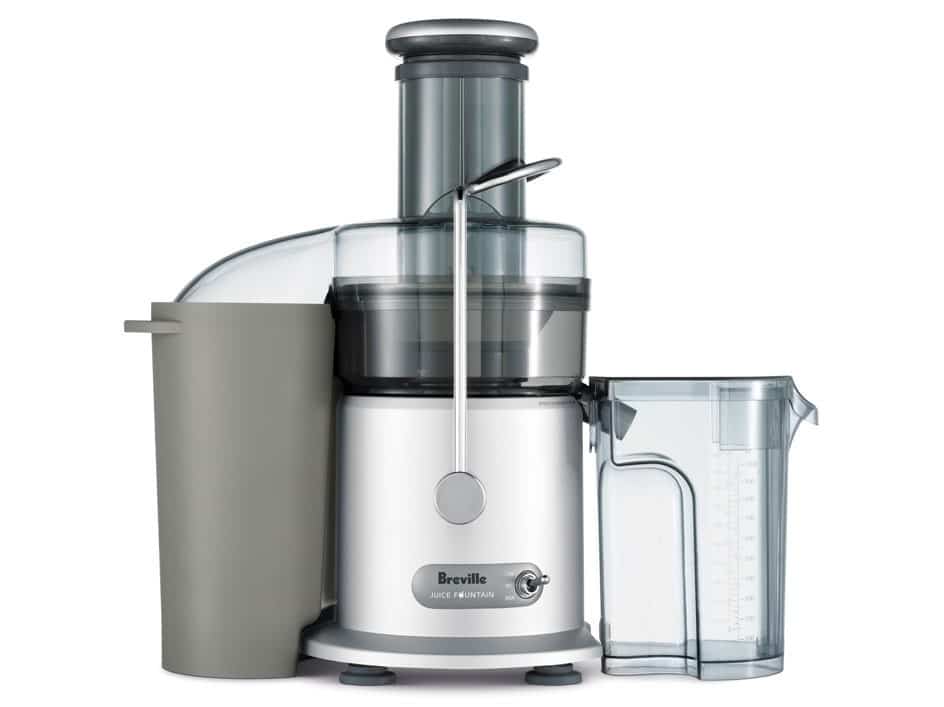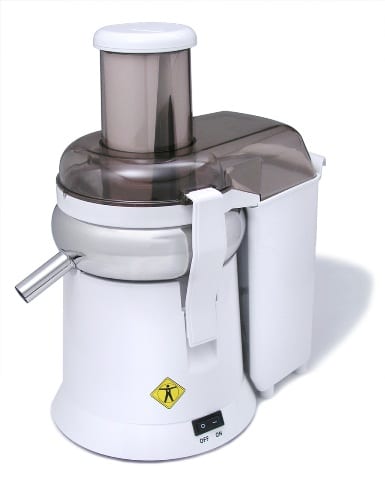The truth about juicing & which juicer is best

Juicing is the best way to quickly extract massive amounts of vitamins, minerals, enzymes and phytonutrients from fruits vegetables and get them into your body. Which is why I drank 8 glasses of veggie juice (mostly carrot) every day for several years as part of my anti-cancer diet. Some natural survivors I know drank 5 juices per day. Cancer patients on the Gerson Therapy drink 12-13 juices per day. So what’s the takeaway? Drink lots of fresh juice! Even just 1-2 glasses per day will do you a ton of good.
Now there are a lot of opinions out there about juicing. Most of these opinions are formed by information that did not come from independent research, but from juicer manufacturers who want to convince you to buy their particular juicer because it produces “the best tasting, highest quality, most nutritious juice”. This marketing influences “expert” opinions who in turn influence us. Trustworthy people are sometimes mislead by wrong information.
What started out as a simple message about juicing for health has in recent years evolved into a strict set of “juicing rules” that people are obsessing about. So much so, that some people stop juicing (or never start) because they’ve been told that any juicer other than the $2,400 Norwalk Juicer is inadequate and not producing nutritious juice. (The Gerson Institute is partially to blame for this)
So before I get into comparing specific juicer models, I want to address a few popular misconceptions about juicing:
“Juice must be consumed immediately or it loses all its nutritional value”
Listen to your instincts and use your rational mind here. Do you really think that’s true?
I made a big 64 oz batch of juice every morning and drank it throughout the day for two years as part of my anti-cancer routine. The only juice I drank “fresh” was the first juice of the day. And I know lots of people who have healed cancer that also made juice in batches like this. So the empirical and anecdotal evidence says, “No.”
But most importantly, there is scientific research that backs this up. Enzyme activity is one of the best ways to measure nutritional degradation in juice over time. And as it turns out, the enzyme activity in juice from many different types of juicing machines actually remains very high for several days after juicing.
Tip: Organic carrots have twice the amylase enzyme activity as conventional carrots. Another reason why organic produce is best, if you can get it.
“High-speed juicing creates heat that destroys the nutrients in juice”
Also not true. For the same reasons mentioned above. Enzyme activity is high in juices from all different types of juicing machines, some are a little higher than others. I used a high speed masticating juicer and I know lots of natural survivors who used high-speed and centrifugal juicers. Centrifugal juicers do tend to oxidize the juice a bit more, but this really only affects how long the juice will keep. If you are drinking it the same day it really doesn’t matter.
*If you are storing juice to drink later in the day, the best practice is to use air tight glass bottles or mason jars, leaving as little air as possible at the top, and keep it in the fridge.
I’m sure some natural health enthusiasts will be shocked by these claims, but before you attack the keyboard to argue with me, see this unbiased analysis conducted by Michael Donaldson PhD at the Hallelujah Acres Foundation.
“Can you make juice with a Vitamix, Blendtec, Nutribullet, etc.”
No. Blenders make blenderized juice, aka smoothies. They do not extract the juice from the pulp. Extracted juice goes right into your bloodstream and requires very little digestive energy, which is why it is so good for cancer patients.
“What about store bought juice?”
It’s not fresh and has usually been pasteurized, which does destroy nutrients, and it may be oxidized as well. So it’s really not an acceptable substitute. If you are buying fresh unpasteurized juice from a local smoothie bar made within a day or so, that’s fine.
“Chris what juicer do you recommend? What is the best juicer?”
Here’s the deal. I’ve used all kinds of juicers over the years and if there’s one thing I’ve learned, it’s that there is no “best juicer”. There are a lot of different juicers out there and guess what, they all make juice. Some make a little more juice than others, some do better with carrots, others do better with leafy greens, some are easier to clean, and some are more durable and last a long time. But as my friend “The Juice Lady” Cherie Calbom says:
“The best juicer is… the one you will use!”
If you have cancer and are about to start a hardcore every day juicing protocol, it makes sense to invest in a nicer juicer. If you are juicing casually, it may not. So here are some comparisons that should help you make up your mind.
The Champion Juicer

The Champion Commercial Juicer ($299) is first on the list because it’s my favorite. Why? Well we spent a lot of time together in my healing journey, so it has a special little place in my heart. On the practical side, it extracts a lot of juice, it’s fast, it’s easy to clean up, and it’s built to last. Plus it’s made in the USA with a 10 year warranty. It meets all the criteria of a great juicer. Our Champion has been in our kitchen working like a “champ” since 2004 and get this, a friend recently told me that her mom has had one for 28 years! One more thing about the Champion. You can feed the pulp back through multiple times and it will extract even more juice.
The Omega J8006 ($265) is also a great juicer, comparable to the Champion. If you are using one now, there’s no need to change.
I also have a Green Star Juicer ($465). It’s the one on the right in the first picture. It is an excellent juicer, but it is bigger, slower and has more parts to clean, so it’s currently living in the attic until my Champion dies.
If you want to extract the maximum amount of juice humanly possible, you can use the Champion as a grinder and then press the juice out with the Peoples Juice Press ($399). This two step process will give you 50% more juice than a Champion or a Green Star/Green Life juicer, and even outperforms the $2,400 Norwalk juicer, extracting 2 oz more juice per pound of carrots, and producing juice with the highest enzyme activity, while saving you $1,700 bucks that you can put toward a Berkey Water Filter, a Vitamix, and lots of organic fruits and veggies. So that’s the ultimate juicing rig.
Let’s compare two of the most popular lower priced juicers…
Breville Juice Fountain Plus

My Dad has a Breville Juice Fountain Plus ($150). He started out with the $450 Green Star juicer (that’s now in my attic), but it took too long to clean. So he replaced it with a Champion, which he really liked and used for many years. Then he got a wild hair and bought a Breville, and decided he liked it better than the Champion because it was even easier to clean. He’s a casual juicer and clearly clean up time is his most important feature. I’ve used the Breville and I like it too. It’s fast, easy to use and definitely easy to clean. It has a two speed motor and a large 3″ feeding tube, which is great, but it only comes with a 1 year warranty. That’s a bit disappointing.
L’Equip XL Juicer

Based on hundreds of ratings and reviews on various sites, I think the best inexpensive juicer is the
L’Equip XL Juicer ($119). It has a stainless steel bowl, blade and basket, and just like the Breville Juice Fountain Plus it’s fast, easy to use, easy to clean up, has a 3″ feeding tube, and takes up very little counter space. But it’s $30 bucks cheaper and comes with a 6 year warranty, which is really terrific. So that puts it over the top. If you can’t afford a $300 juicer right now, I think this would be a great one to start with.
“Which juicer is best for greens?”
Greens are hard to juice because they don’t have much juice in them. This is why most juicers just don’t juice greens very well. A pound of spinach gets you like a squirt of juice. Every time I tried to juice greens I always felt like I was wasting them, years ago I decided to just eat greens whole or blend them up in smoothies in my Vitamix.
“What do you think about the (insert juicer name here)?”
What do you think about it? If you have one and like it, then keeping using it. I’ve used other juicers, which I chose not to mention in this post, because I think the juicers above really are the best in their respective prices ranges, and I didn’t want to overwhelm you comparing the subtle pros and cons of dozens of juicers. So there you go. Now you have my opinion, but when in doubt, remember what Cherie Calbom says,
“The best juicer is the one you will use!”
Labels: colon hydrotherapy philadelphia, colonic philadelphia, health, juicing, nutrition







0 Comments :
Post a Comment
Subscribe to Post Comments [Atom]
<< Home